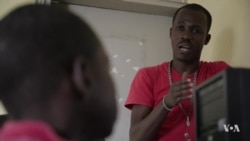Lined up along the wall of what used to be a living room, a dozen children — some as young as 10 — are focused on their computer screen, trying to make an animated cat come alive electronically.
"How will the cat move? We are going to program it to move," their teacher tells them.
A few clicks, and the orange animal is walking across the screen.
The one-story house in Ivory Coast is home to the Baby Lab, a play on words with "Babi," Abidjan's nickname. The lab aims to bridge the digital divide in one of the city's poorest neighborhoods, Abobo.
The lab was created two years ago by IT engineers who also volunteered to teach, explains Obin Giako, one of the co-founders.
"Digital technology is still reserved for the elite. We think it belongs to everyone," Giako said. "It is something everyone should master — especially coding, which is the language of the 21st century."
Similar fab labs, or fabrication laboratories, have opened up across the continent, including in nearby Burkina Faso, Togo, Mali and Senegal.
The Baby Lab received donations from a French bank and the French government to buy computers, but it remains mostly self-funded.
Outside, a pile of old computer parts, keyboards, and motherboards sit in a corner.
The philosophy of the lab is the circular economy in that nothing is wasted; everything can be transformed.
Standing by a table, IT engineer Ghislain Dessieh picks apart a hard drive.
The hard drives he is dismantling are broken and cannot be repaired, Dessieh says, unveiling the finished product — the hard drive standing straight on a table, and two clock hands in the middle of the round-shaped, shiny part of the drive.
The clocks will be sold to help finance the Baby Lab.
The lab wants to inspire children to think creatively and work together — hence, computer frames are piled up to make tables; keyboard keys are turned into bracelets; and storage cans are converted to low-cost CPU containers.
At a nearby table, 12-year-old Awa Traoré is fiddling with a screwdriver, swiftly assembling spare parts as another child looks on. In about five minutes, she has assembled a small electronic car.
When the pre-teen walked into the lab last year, she had little knowledge of electronics. She has no computer at home.
Awa Traoré says she learned to create a website using HTML and learned electronic music. Someday, she says, she wants to be an IT engineer and teach electronic music to children around the world.
The next step, Giako says, is to create a regional platform in order to collaborate with other French-speaking fab labs.














